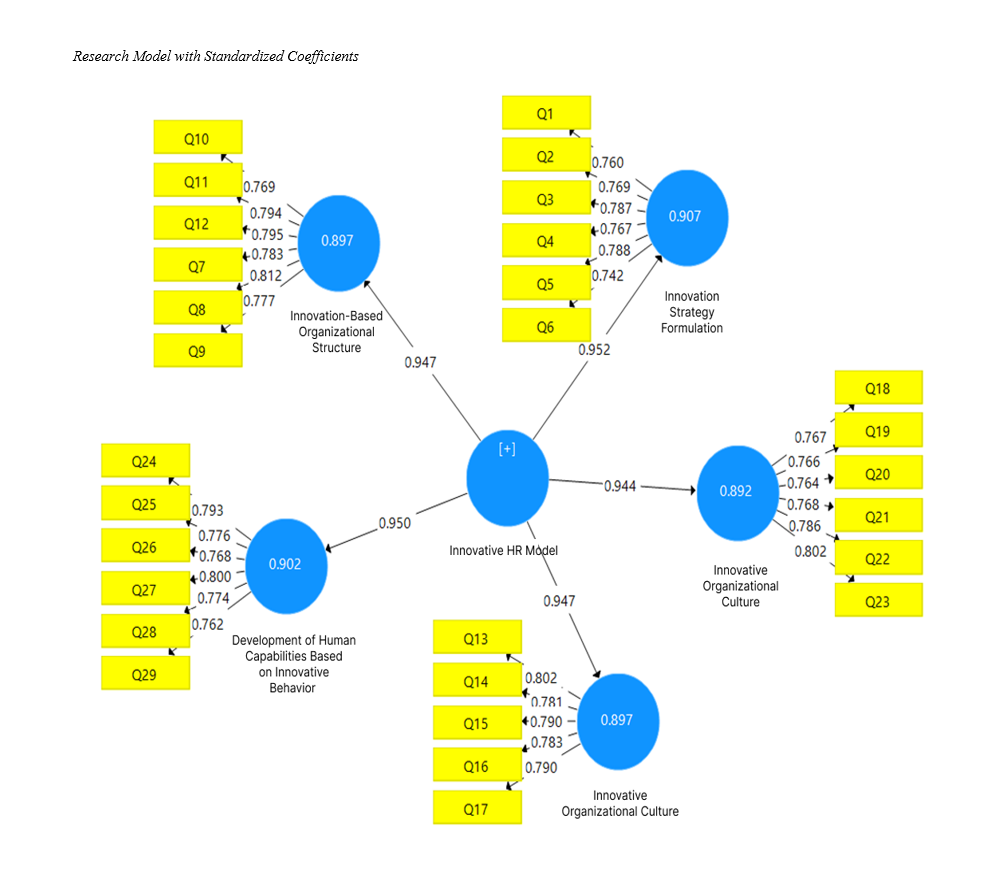An Examination and Evaluation of the Innovative Human Resources Model in Iraqi Higher Education Institutions
Keywords:
Innovative human resource model, higher education institutions, organizational innovationAbstract
The objective of this study is to examine and evaluate an innovative human resources model tailored to the context of higher education institutions in Iraq, with the aim of enhancing organizational innovation, adaptability, and performance through strategic HR practices. This research adopts a mixed-method exploratory-applied design, combining qualitative and quantitative approaches. The qualitative phase involved thematic analysis of semi-structured interviews with 10 academic experts and senior managers in Iraq’s higher education sector, selected through purposive sampling until theoretical saturation was achieved. The quantitative phase used a researcher-developed questionnaire distributed to 137 participants, including managers, deputies, and HR specialists from higher education institutions, identified using Cochran’s formula. Structural equation modeling (SEM) was applied using Smart PLS to assess the relationships between the components and dimensions of the proposed model. Data were collected through both library and field methods. The results of the qualitative phase led to the identification of five primary dimensions: innovation strategy formulation, development of an innovation-based organizational structure, promotion of an innovative organizational culture, development of innovative systems and processes, and enhancement of human capabilities based on innovative behavior. Quantitative analysis confirmed the statistical significance of all relationships, with all t-values exceeding 1.96 and factor loadings above 0.94, indicating strong model validity. The overall model fit index (GoF) was calculated at 0.69, suggesting a robust model capable of explaining the interactions among variables influencing innovative HR practices in higher education. The study concludes that implementing an innovative human resources model significantly contributes to fostering creativity, collaboration, and strategic adaptability within higher education institutions. The integration of innovation-focused HR practices—such as training, empowerment, participatory decision-making, and performance incentives—creates a conducive environment for sustainable institutional development. These findings offer actionable insights for academic administrators aiming to align HR strategies with organizational innovation goals.
References
Akhoundinia, M., & Baharloo, R. (2023). Investigating the Effects of Knowledge Management Capacity on the Performance of Ghadir Neyriz Steel through Strategic Human Resource Management and Technical and Administrative Innovation. The 5th International Conference on Management and Industry, https://en.civilica.com/doc/1772064/
Al-Hariri, B., Nour Eldin, A. A., Amr, A., & Abu Dehab, M. S. (2023). The Interactive Effect of Workplace Bullying and Sustainable Human Resource Management on Innovative Work Behavior through the Mediation of Work Engagement: An Application to Sustainable Egyptian Universities. Journal of Financial and Commercial Research, 24(2), 598-657.
Al Daboub, R. S., Al-Madadha, A., & Al-Adwan, A. S. (2024). Fostering firm innovativeness: Understanding the sequential relationships between human resource practices, psychological empowerment, innovative work behavior, and firm innovative capability. International Journal of Innovation Studies, 8(1), 76-91. https://doi.org/10.1016/j.ijis.2023.12.001
Bahiroh, E., & Imron, A. (2024). Innovative Human Resource Management Strategies in the Era of Digital Transformation. Management Studies and Business Journal (PRODUCTIVITY), 1(2), 154-162. https://doi.org/10.62207/6wnrgj39
Balabonien, I., & Vecerskiene, G. (2014). The peculiarities of performance measurement in universities. 19th International Scientific Conference Economics and Management 2014, https://www.researchgate.net/publication/275537758_The_Peculiarities_of_Performance_Measurement_in_Universities
Chen, M., Wu, M., Wang, X., & Wang, H. (2024). The differential effects of human resource management on organizational innovation: a meta-analytic examination. International Journal of Manpower, 45(3), 576-596. https://doi.org/10.1108/IJM-08-2021-0487
Crowther, D., & Seifi, S. (2017). Modern Organisational Governance: Re-Examining Governance: The Evidence. Developments in Corporate Governance and Responsibility, 12, 3-15. https://doi.org/10.1108/S2043-052320170000012001
Esmaeil Kamali Rad, S., Afsharneb, S., & Kheireh Cheshm, B. (2024). Investigating the Impact of Large-Scale Human Resource Management on Organizational Innovation and Performance (Case Study: Bushehr Province Electricity Distribution Company). Scientific Journal of New Research Approaches in Management and Accounting, 7(26). https://majournal.ir/index.php/ma/article/view/2167
Garg, N., Murphy, W. M., & Singh, P. (2022). Reverse mentoring and job crafting as resources for health: a work engagement mediation model. Journal of Organizational Effectiveness: People and Performance, 9(1), 110-129. https://doi.org/10.1108/JOEPP-12-2020-0245
Karim, T. I., Chowdhury, A. M., & Karim, A. R. (2024). The Impact of Educational Management on the Higher Education: International Perspective. International Journal of Academic Research in Business and Social Sciences, 14(1), 427-439. https://doi.org/10.6007/IJARBSS/v14-i1/20462
Shaddiq, S., Khuzaini, & Irpan, M. (2023). Governance of Human Resources Management in the Digital Era. Journal of Business and Management Studies, 5(3), 80-96. https://doi.org/10.32996/jbms.2023.5.3.8
Shipton, H., Sparrow, P., Budhwar, P., & Brown, A. (2017). HRM and innovation: looking across levels. Human Resource Management Journal, 27(2), 246-263. https://doi.org/10.1111/1748-8583.12102
Wongsansukcharoen, J., & Thaweepaiboonwong, J. (2023). Effect of innovations in human resource practices, innovation capabilities, and competitive advantage on small and medium enterprises' performance in Thailand. European Research on Management and Business Economics, 29(1), 100210. https://doi.org/10.1016/j.iedeen.2022.100210
Zaakiyyah, H. K. A. (2024). Innovative Strategies to Enhance the Quality of Higher Education Management: Human Resource Development and the Critical Role of Communication. Journal of Contemporary Administration and Management (ADMAN), 2(1), 331-336. https://doi.org/10.61100/adman.v2i1.128
Zarif, A., A, K., & Ranjbar, M. (2023). Investigating the Impact of Human Resource Development on Sustainable Competitive Advantage with the Mediating Role of Organizational Innovation (Case Study: Parsian Gas Refining Company). Quarterly Journal of Human Resource Training and Development, 4(3). https://journals.iau.ir/article_709288.html?lang=en

Downloads
Published
Submitted
Revised
Accepted
Issue
Section
License
Copyright (c) 2024 Thikra Jawad Kadhim Alaaedi (Author); Sayyed Hamidreza Mirtavousi; Latif Abdulridha Atiyah, Sayyed Mohammad Reza Davoodi (Author)

This work is licensed under a Creative Commons Attribution-NonCommercial 4.0 International License.









